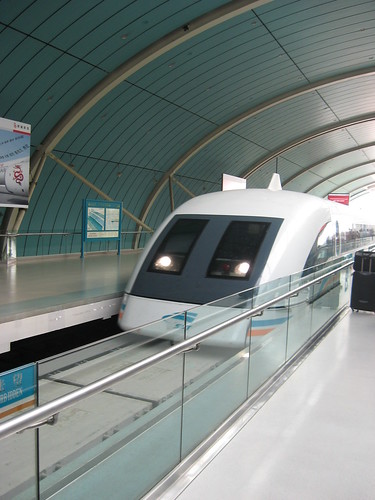The Train from Shanghai
Outside the Shanghai Art Museum, as part of the current 7th Shanghai Biennale, stands the rusting hulk of a mid-twentieth century locomotive. Close by stands a similarly-rusted group of Communist Party cadres waving in metallic decay at the departing, but static, train.
The installation by Chinese artist Jing Shijian refers to the “Up to the Mountains and Down to the Villages” campaign in the 1960s and 1970s, during which many students, even teenagers, were pressured to leave the city on trains like these to work in rural areas. These have since been described as a sort of lost generation for China, forced into rural exile and losing opportunities for formal education.
The Biennale is being attended by a quite different group of young Chinese students, with a range of opportunities and ambitions that contrast with those of their parents' generation. Groups were posing happily in front of the installation and with the iron Red Guards. Some of these are looking to travel much further afield, perhaps even overseas to Australia, to take opportunities for education.
One such was Ms Zhang, a young woman from Nanjing who came to the recent University of Melbourne Expo in Shanghai. Nanjing is not very far from Shanghai - 3 hours if you get the right train (if you are on a bus with a driver who doesn't know the way very well it can be more like 4 1/2 hours, but that's another story...). Ms Zhang caught the train to attend our late-afternoon event at the JC Mandarin Hotel and spent the whole four hours in conversations with faculty members and staff, learning about the Melbourne Model, Trinity College Foundation Studies, and the challenges and opportunities of life and study in Melbourne. Unlike some of her contemporaries she is not intent on Commerce or Medicine but wants to study Arts, with a strong interest in Media. She is not from a wealthy family - her parents are factory workers - but she has done very well at school and attends one of Nanjing's leading secondary schools. Her journey to Australia still faces some real hurdles.
Wanting to attend all the workshops we ran she and her friends found they could not catch the train they had booked for. They were short on cash and our staff were wondering how to assist them, given they had no money for a hotel room either. In the end they were happy to find they could re-book on the 11.33pm train, a milk-run that would take 6 hours to get home - they had no seats either, but would be standing or perched on bags and boxes. This hardly dampened their enthusiasm - they were so tremendously excited by what they had seen and learned.
The next day I left Shanghai, taking the Maglev train to Pudong airport. The train reaches speeds of 430 km/h during its 7 minute journey. It was the day of the Shanghai F1 Grand Prix, and I was travelling faster than Lewis Hamilton. It was sobering to think how easy this journey was compared those of Chinese students now, let alone longer ago.

